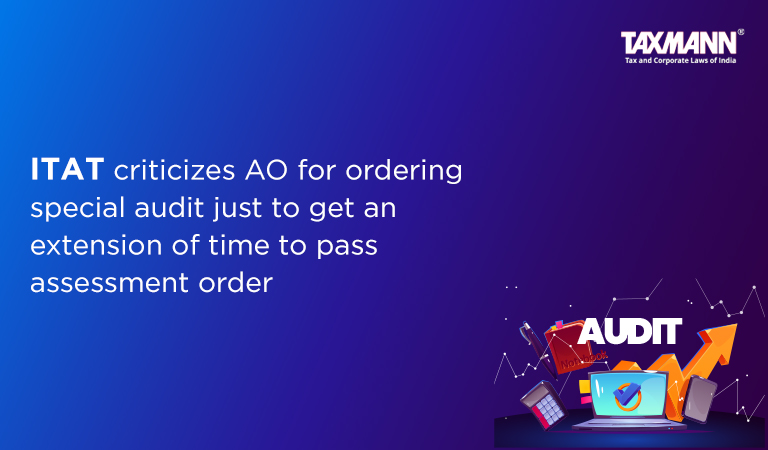ITAT criticizes AO for ordering special audit just to get an extension of time to pass assessment order
- Blog|News|Income Tax|
- 2 Min Read
- By Taxmann
- |
- Last Updated on 9 January, 2023

Case Details: Rajiv Kumar v. ACIT - [2023] 146 taxmann.com 115 (Chandigarh-Trib.)
Judiciary and Counsel Details
-
- Sanjay Garg, Judicial Member & Vikram Singh Yadav, Accountant Member
- Parikshit Aggarwal, CA for the Appellant.
- Rohit Sharma, CIT, DR, for the Respondent.
Facts of the Case
The issue before the Chandigarh Tribunal was
“Whether the Assessing Officer (AO) was justified to order the appointment of special auditor under section 142(2A) and thereby get additional time to frame the assessment in terms of Section 153?”
ITAT Held
The Tribunal held that per the provisions of section 142(2A), it was only the nature and complexity of the accounts, for which the matter could be referred by the AO to the special auditor.
However, in the instant case, the AO did not look at the accounts at all before forming the opinion that the same was complex. Even the assessee was not given the opportunity to object to the said action.
The service of notice was defective and rather, no service in the eyes of law. The case being based on search conducted under section 132, the assessment of the block period of AYs 2001-02 to 2007-08 was conducted simultaneously by the AO.
During the assessment proceedings, there were no allegations of non-compliance on the part of the assessee, and all notices were properly served. However, the service of notices under Section 142(2A) for the appointment of a special auditor was shown to have been effected through substituted service (i.e., by affixture). This violated the principles of natural justice.
The Tribunal also emphasized that the Supreme Court in Sahara India (Firm) [2008] 169 Taxman 328 (SC) did not restrict the right of an assessee to contest an order for reference to a special auditor under Section 142(2A). In fact, the Supreme Court specifically recognized this right for the assessee.
Thus, the order appointing Special Auditor under section 142(2A) passed by the AO is bad in law. Since the extended period was taken by the AO under the guise of Special audit, hence the same couldn’t be counted for computing the period of limitation to pass the assessment order.
Disclaimer: The content/information published on the website is only for general information of the user and shall not be construed as legal advice. While the Taxmann has exercised reasonable efforts to ensure the veracity of information/content published, Taxmann shall be under no liability in any manner whatsoever for incorrect information, if any.

Taxmann Publications has a dedicated in-house Research & Editorial Team. This team consists of a team of Chartered Accountants, Company Secretaries, and Lawyers. This team works under the guidance and supervision of editor-in-chief Mr Rakesh Bhargava.
The Research and Editorial Team is responsible for developing reliable and accurate content for the readers. The team follows the six-sigma approach to achieve the benchmark of zero error in its publications and research platforms. The team ensures that the following publication guidelines are thoroughly followed while developing the content:
- The statutory material is obtained only from the authorized and reliable sources
- All the latest developments in the judicial and legislative fields are covered
- Prepare the analytical write-ups on current, controversial, and important issues to help the readers to understand the concept and its implications
- Every content published by Taxmann is complete, accurate and lucid
- All evidence-based statements are supported with proper reference to Section, Circular No., Notification No. or citations
- The golden rules of grammar, style and consistency are thoroughly followed
- Font and size that’s easy to read and remain consistent across all imprint and digital publications are applied



 CA | CS | CMA
CA | CS | CMA
